

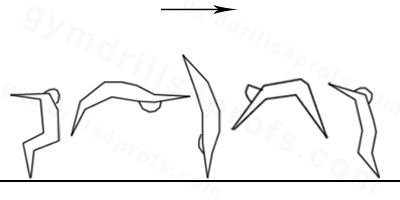
A back handspring usually begins from a round-off, second back handspring, or tempo-salto. Its purpose is for accelerating the tumbling speed in order to end the pass with a backflip skill. The starting position begins with a deep hollow position, with the arms over the head. The chin should be down with the hips tucked. The legs are slightly bent and in front of the hips. The gymnast should jump backward and kick back with tight arms. They should arch their body until their hands reach the surface of the floor. As soon as the gymnast touches the floor, the body should be in a tight arch, slightly before the handstand position. Next follows a strong whip, which will bring the legs to the floor much faster. The wrists should push back aggressively onto the floor until the end of the fingers. The gymnast performs a snap down during the flight until they land on their feet. In order to perform the following skill, the ending position should be equal to the starting position. Or in the case of a flipping skill, the ending position should be slightly arched with extended hips, tight legs, and arms over the shoulders.
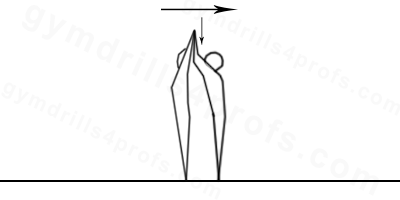
This drill strengthens the shoulders, arms, and core by having the gymnast resist downward pressure, mimicking the hand-placement phase of a back handspring. With arms raised overhead, the gymnast holds a strong, straight position while the coach applies downward pressure on their hands. The gymnast must resist this force without letting their arms or upper body collapse, engaging the shoulders, back, and core to maintain stability.
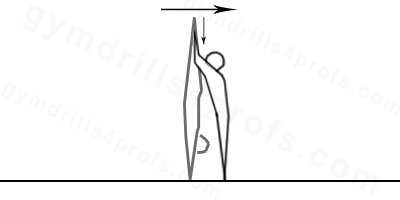
The Handstand Push-Down Drill is designed to build strength, stability, and control in the shoulders, arms, and core by simulating the moment when a gymnast's hands make contact with the floor during skills like back handsprings. In this drill, the gymnast kicks up into a handstand while the coach supports their legs to ensure proper alignment. The coach then applies gentle downward pressure, and the gymnast must resist this force by keeping their body tight and stable, engaging the shoulders, arms, and core to prevent the arms from bending or collapsing.

The gymnast leans back on the vault table. With the arms at the horizontal position, the gymnast should execute a strong kick back. The drill finishes with the gymnast hitting the table with their arms. Repeat the move several times.

From 45° under horizontal, the gymnast raises the dumbbells over and behind the head. Arms are tight. The body is in a hollow position. Repeat several times.

Hook a bungee around the wall bar (also known as a stall bar or Swedish ladder), the height of the bungee should be equal to the height of the gymnast’s hips/belly. The gymnast should face the wall, grab the elastic and pull it back behind the body. The arms should be tight and the body straight.
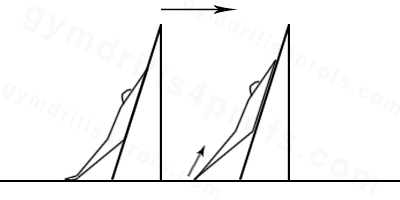
This drill targets the key elements of the back handspring takeoff—push-back motion, arm swing, and hip lift—by training the gymnast to coordinate explosive power and body control. With a cheese mat placed vertically against a wall, the gymnast begins in a slightly piked position, leaning back with feet forward and arms angled above horizontal. From this setup, the gymnast pushes sharply through the toes, swings the arms quickly overhead, and lifts the hips in one fluid, explosive motion. This coordinated action simulates the powerful and dynamic initiation of a back handspring, emphasizing tight posture, core engagement, and precise timing between the feet, arms, and hips
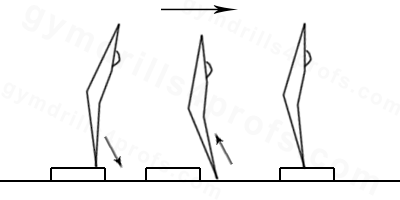
This drill builds the explosive power, timing, and body control essential for the initial jump of a back handspring by training the gymnast to coordinate a forward jump with a quick rebound. Starting tall at the edge of a panel mat with arms extended overhead and core engaged, the gymnast jumps forward to land just in front of the mat, then immediately bounces back onto it using strong, tight legs and an explosive push through the toes. Throughout the drill, the arms stay extended overhead and the body maintains a tight, slightly hollow position, reinforcing proper alignment, leg control, and core engagement needed for effective takeoff in tumbling.

The starting position is a straight body, bent legs, tight arms at the horizontal, with the head in the middle position. The gymnast jump back should be as strong as possible, with an aggressive kickback from the arms. The scope is to land as far as possible.
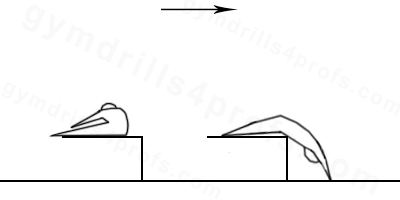
This drill builds body control by transitioning from a pike to an arch, mimicking movements in tumbling. The gymnast starts seated on the edge of a resi mat, folds into a tight pike, then rolls back into an arch with arms extended overhead. As the hands reach the floor, the gymnast either holds a front support or performs a snap-down to stand, reinforcing coordination, core strength, and controlled hand placement.
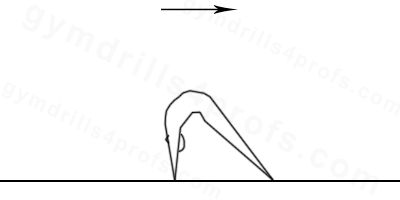
The gymnast lays back with bent legs and bent arms, around the head. Then tightens the legs and arms together. The gymnast pushes back from the shoulders in order to pass the arms over vertical and to open the shoulder angle as much as possible. Legs are together. Arms and legs are completely tight.

From a standing position, the arms are tight over the head. The gymnast slowly leans back until their hands reach the floor in a bridge position. The head is slightly open, watching and following the hands.
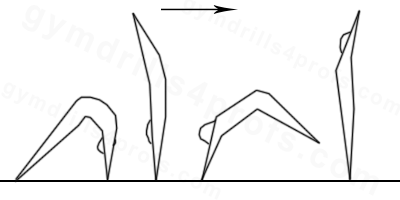
From a bridge position, the gymnast pushes back from their shoulders and their chest. They should raise their feet above the floor, and lift their legs until they reach handstand. Then slowly lower the tight legs until they reach the floor and stand up with their arms over their head.

This drill teaches proper handstand technique by emphasizing body alignment, balance, and control throughout the skill. Starting in a lunge with the dominant leg forward and arms extended overhead, the gymnast kicks up into a handstand by placing their hands shoulder-width apart and driving the back leg upward, followed by the front leg. Once in the handstand, the gymnast maintains a tight core and straight body line from wrists to toes, pressing through the shoulders and keeping the head neutral to stay balanced. As proficiency improves, the gymnast adjusts with fingers and wrists to hold the position. To finish, the gymnast lowers one leg into a controlled lunge or smoothly pikes down or rolls out, maintaining form and control throughout the dismount.
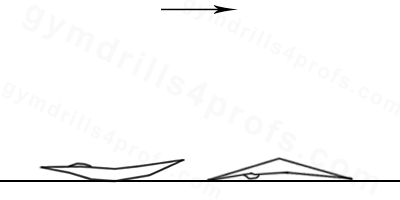
This drill strengthens and refines the transition from a backbend to a snap-down, preparing gymnasts for the second half of a back handspring. Starting in a muscular arch while lying on their stomach, the gymnast lifts their chest, arms, and legs to build flexibility and control in the shoulders and hips. From there, they engage the core to shift into an inverted hollow position with hands and feet on the floor, simulating the snap-down motion. Repeating this movement builds muscle memory, control, and strength needed for a clean and stable landing during a back handspring.
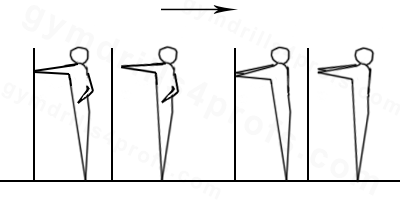
The push-back wall with arms drill strengthens the shoulders, wrists, and arms by simulating the pushing action used in skills like back handsprings, front handsprings, and round-offs. The gymnast stands in a tight, hollow position facing the wall, starting with single-arm pushes—pressing one hand into the wall while isolating the shoulder, progressing the push from shoulder to fingertips. After several reps on each arm, the gymnast performs double-arm pushes to reinforce even, controlled engagement through both shoulders. This drill builds the power and control needed for strong, effective push-offs from the floor.

The gymnast performs a handstand on the wall. The body should be arched, slightly before the handstand position, with their shoulder angle extended and their head slightly open. The gymnast should watch their hands, then follow with a snap down move. This move should have the hands aggressively pushing down on the floor. The gymnast’s legs should pike from the hips in order to reach the floor as fast as possible. The ending position is with tight legs in front of the hips, body in a tight hollow, and the arms around horizontal with a closed head.
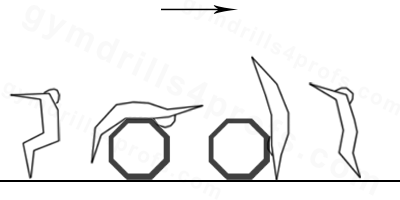
This drill helps gymnasts develop the motion, timing, and confidence for a back handspring using the support of a barrel mat. Starting with arms overhead and feet together, the gymnast jumps backward onto the barrel, landing the upper back in a controlled arch. As the body rolls over the barrel, the legs follow, and the hands reach for the floor in a strong, extended position. Once the hands make contact, the gymnast snaps the legs down with power and control, landing on their feet in a tight hollow shape. This drill emphasizes a controlled jump, full-body engagement, and a strong snap-down, making it a valuable tool for safely learning and refining the back handspring technique.

When the gymnast becomes familiar enough with the move in its entirety, the coach should start spotting them for a back handspring from a standing position. The gymnast’s arms should stay close to the head.

An easy way to execute the skill in its entirety is to perform in on a cheese mat. The coach should spot the gymnast until they are performing it on their own.
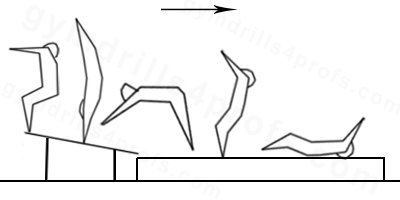
This drill helps gymnasts build the control, timing, and body tension needed to connect two back handsprings in a sequence. Using a mini trampoline and an adjacent 8-inch mat, the gymnast performs a back handspring off the tramp, focusing on a powerful push-off and maintaining a tight hollow position. After landing on their feet on the mat, they immediately rebound and finish by lying in a solid hollow shape, simulating readiness for the next skill. This drill trains momentum control and body stability, reinforcing the mechanics required to smoothly link multiple back handsprings.

This drill is a modification of the previous one. There is no inclined surface, but the trampoline enables the gymnast to jump easier. As the gymnast improves, a panel mat could be added to the trampoline to reduce the bounciness.

The back handspring to front support drill is an intermediate progression that helps gymnasts focus on the backward motion and body alignment of a back handspring without performing the snap-down. After reaching the handstand position, the gymnast lowers with control into a front support on the floor, maintaining a tight, straight body line throughout. This controlled descent builds shoulder and core strength while reinforcing proper form and timing, making it a safe and effective way to prepare for the full back handspring.
Integral part of gymnastics coaching process are skill drills. They help gymnasts to learn easier and technically correct. With GYM DRILL PRO you will find variety of ideas for the most the basic gymnastics skills. There are plenty of images with skill drill progressions. It is intended to support explicitly the qualified coaches in their daily coaching business. DO NOT practice without the guidance of proper professionals.